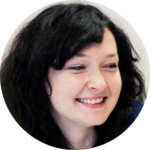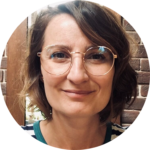Rethinking Commemoration
ON ONE FOOT
The Rethinking Commemoration project invited the rethinking of how Jewish memory sites could be commemorated and cared for in contemporary Poland and beyond with an eye toward their environmental impact.
THE WHOLE MEGILLAH
The Rethinking Commemoration project asked a critical and timely question: How can we meaningfully mark the sites of important historical Jewish events while respecting the environment and the impact humans have on it?
To address this complex issue, NGF Network members Magda Rubenfeld Koralewska and Agnieszka (Aga) Jabłońska organized three live conversations and commissioned essays from five experts around the themes of difficult heritage and non-invasive commemoration. They used two sites as the entry point into the conversation: the former concentration camp KL Plaszow in Krakow, and the former German-Jewish cemetery in Wrocław. Both of these sites, which are currently insufficiently marked or unmarked and largely forgotten, are now used as regular recreational spaces and living spaces in contemporary cities.
Rethinking Commemoration provoked rethinking how Jewish memory sites could be commemorated and cared for. More than 400 participants from around the world joined in these meaningful conversations, reflecting on an environmentally friendly and historically sensitive path forward. The project culminated in the publication of an e-book in Polish, “Green Commemoration: Towards New Strategies of Remembering in Public Space.” The book comprised articles by artists, academics, memory activists, and practitioners all searching for ways to use the memory encoded in landscapes to shed light on violent neglected histories.
“We must learn to read nature, to look at it carefully with open eyes and senses to sharpen our understanding of what happened, understand it and describe it,” said Martin Pollack, Austrian writer, journalist, translator, and promoter of Polish literature. “Reading and narration of nature converge and condition each other. If we surrender to nature, to what it has to say to us, maybe we will understand ourselves better, maybe it will allow us to expand our awareness.”
By elevating this emerging approach to preserving history, the project fostered a new community of people dedicated to Ecological Humanities. The e-book can now be provided to participants of other events related to the commemoration of Jewish sites and will be a valuable resource around the world for years to come.
“I feel privileged and lucky to have been able to find my community through this cooperation,” Aga said. “It opened so many more opportunities in my professional and personal life.”
ABOUT THE GRANTEES

Magda Rubenfeld Koralewska
Poland
Magda Rubenfeld Koralewska is a firecracker and a leader in things young, innovative, and Jewish in Poland. She is a graphic designer, community builder, and activist – particularly passionate about social change and the intersection of learning and the arts. Magda cofounded Beit Krakow (the first post-war progressive community in Krakow), Jew Not Painted (presenting illustrated 19th-century history of Jews in Poland), and FestivALT (a program of radical Jewish art investigating complexities of contemporary Jewish Poland). Magda currently works as Limmud’s Regional Coordinator for Central and Eastern Europe.
Magda is an alumna of NGF 22 in Croatia in 2010.

Agnieszka Jabłońska
Poland
Agnieszka (Aga) Jabłońska is an experienced project manager, cultural activist, and researcher. Born and raised in Wrocław, Poland, she studied in France, Germany, and Sweden. In 2020, Aga co-founded and is currently leading the Urban Memory Foundation (UMF), an NGO in Wrocław working with the Jewish heritage of the city. UMF brings the memory and heritage of Breslau Jews closer to the minds and hearts of a variety of audiences, especially to the citizens of Wrocław. Aga also works for the Middle East Entrepreneurs of Tomorrow (MEET), an educational organization based in Jerusalem that teaches computer science and social entrepreneurship in partnership with MIT. MEET aims to empower a new generation of young Israeli and Palestinian leaders who can create positive social and political change in the region.
Magda and Aga met in 2020 thanks to a common friend and community member. However, it was the NGF Collaboration Grant opportunity that encouraged them to start working together. They started brainstorming and exchanging ideas, analyzing the needs in our communities and came up with the idea for this project.
Aga attended NGF 31 in Israel in 2019.
PROGRAM GOALS
- To draw attention to nature as an actor, witness, evidence and archive, which can be an important source of knowledge for those studying the past — including genocidal violence.
- To contribute to the spread of the Ecological Humanities, and provoke a re-thinking of how Jewish memory sites could be commemorated and cared for in contemporary Poland and beyond.
HIGHLIGHTS
- The creation of a new community of people interested in this new approach to landscape and memory
- “Green Commemoration: Actions Through Art” – an in-person event in Krakow at the KL Plaszow site, Poland organized on 15 October 2022
- The publication of an E-book in Polish: “Green Commemoration: Towards New Strategies of Remembering in Public Space”
WHAT'S NEXT
Magda and Aga are hoping to have the e-book translated into English for wider dissemination.
